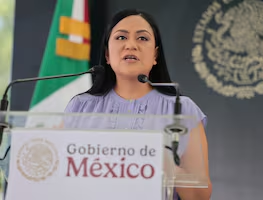Más Información

Sheinbaum anuncia obras de infraestructura en Nayarit; destaca puente que irá de Bahía de Banderas a Puerto Vallarta y un acueducto

Detienen a presunto jefe de célula delictiva allegada a Los Chapitos; se encargaba de narcomenudeo y compra-venta de armamento

“¡Arráncate, Coalcomán!”; así fue la campaña de Anavel Ávila, presuntamente ligada al “Mencho”, para Movimiento Ciudadano

Presupuesto para programas sociales está asegurado en la Constitución: Ariadna Montiel; destaca que se benefician a 320 mil nayaritas

Sheinbaum anuncia construcción de Farmacias del Bienestar en 2025; asegura habrá medicamentos gratuitos para personas vulnerables

“Corrupción se quedó en el pasado”, asegura Sheinbaum; afirma que gobierno no tocará recursos del pueblo
The School of Chemistry of the National Autonomous University of Mexico (UNAM) has been approved to perform rapid tests to diagnose COVID-19 as a measure of epidemiological surveillance.
The UNAM informed through a statement that the authorization was issued by the Dr. Manuel Martínez Báez Institute for Epidemiological Diagnosis and Reference (INDRE) so it will be able to make this service available to the public health sector.
Recommended: UNAM to launch new laboratory for COVID-19 vaccine research
The samples will not be collected by members of the Pre-clinical Investigation Unit (UNIPREC) and of the Food and Biotechnology Department since they will only be in charge of analyzing them in real-time through a PCR .
“Hospitals will send them and we’ll analyze them to detect the presence of the virus and the disease it causes,” said Maricarmen Quirasco Baruch , the coordinator of the academic team.
Recommended: Mexican scientists decode the genome of COVID-19 genetic variants
The School of Chemistry showed that its laboratory has the technical capacity for the detection of coronavirus in low concentrations so it was authorized.
The INDRE authorization that implies the UNAM laboratory has the capacity to offer the diagnosis was obtained with the joint effort of the UNIPREC and the Food and Biotechnology Department , as well as with authorities from the School of Chemistry that have given their support to the project.
Recommended: IPN scientists develop rapid diagnostic tests for COVID-19
mp




